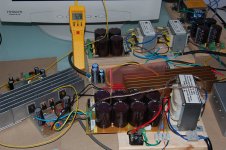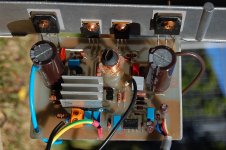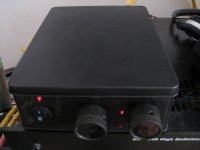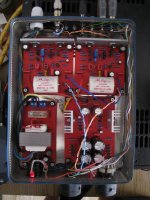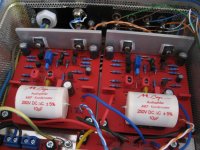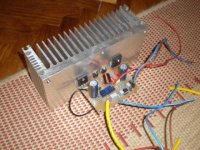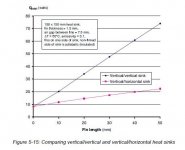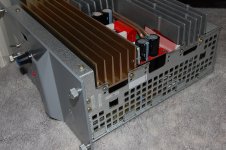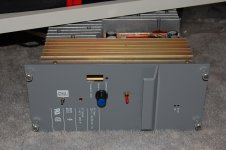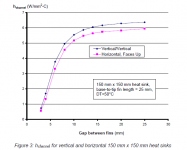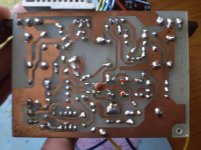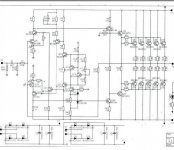not only happy but deeply honored is what i fell.
I use to say, to people in my place, that i am his friend, that he send me messages from time to time...that he even answer some of my messages.
hehehehe... This promotes me a lot...you do not imagine the respect they look at me.
The man is an Engineer, a skilled one, not a young engineer, a senior one!... with expertise and passion for audio, the man is a College teacher... anything can be better than that!
Lucky... very lucky we are.
regards,
Carlos
Like "Unsung Hero"..... I would call, Carlos.
His designs are unusual but performs surprisingly good.
Just Build & Listen. Than comment on it. hehehehe
Cheers.......Raj
hey, looking at Legend Quasor, each channel output is kind of split in two, with each their own dedicated driverstage
The obvious thing, it seem like its easy to totally seperate output into two biamp outputs
and if set up that way, and one wants the full output, its only a matter of paralel output terminals
double zobels might be a small issue thou
not that Im a fan of biamping, nor is it my goal, but would it work with appropriate lower voltage, ofcourse
with appropriate lower voltage, ofcourse
The obvious thing, it seem like its easy to totally seperate output into two biamp outputs
and if set up that way, and one wants the full output, its only a matter of paralel output terminals
double zobels might be a small issue thou
not that Im a fan of biamping, nor is it my goal, but would it work
 with appropriate lower voltage, ofcourse
with appropriate lower voltage, ofcourseMy DOGC-Mk3
Many thanks to Dr Bora, who share many of his amplifiers. I thought that I should try at least one: DOGC-Mk3.
The main reason for me to choose DOGC is Dr Bora's introduction to this amplifier:
"Amplifier is absolutely stabile in operation and will deliver extremely high quality of sound. It posses remarkable dynamic and transparency as well as excellent extension of frequency spectrum on both ends. Give it appropriate and capable PSU and sufficient heatsink and you will be amazed with what this amp can deliver, having on mind its simplicity and overall costs! You won't be ashamed to use it side by side with most brand name amps of similar power within 1000-1500US$ price class."
First at all, the amp is very easy to build & there is no adjustment. I bought all my parts (excluding the PSU & BJT ouput transistors) from Farnell and it cost me less than $20.
I have to agree with every word in Dr Bora's comments quoted above - the amp sounds great & smooth - it adds air to the music. I don't have the audiophile's vocab & that is the best that I can describe the sound.
It does require a robust PSU, the DOGC sounds quite thin with a PSU with 4x8200uF filter caps and swapping to a PSU with 8x8200uF filter caps transform the amp into a great-sounding amp.
It does require a generous heatsink - my heatsink is a bit small & it is about 55C at idle. The temperature does not go up much for normal listening as the driver bias is set at 330mA.
Attached is some pictures.
Many thanks to Dr Bora, who share many of his amplifiers. I thought that I should try at least one: DOGC-Mk3.
The main reason for me to choose DOGC is Dr Bora's introduction to this amplifier:
"Amplifier is absolutely stabile in operation and will deliver extremely high quality of sound. It posses remarkable dynamic and transparency as well as excellent extension of frequency spectrum on both ends. Give it appropriate and capable PSU and sufficient heatsink and you will be amazed with what this amp can deliver, having on mind its simplicity and overall costs! You won't be ashamed to use it side by side with most brand name amps of similar power within 1000-1500US$ price class."
First at all, the amp is very easy to build & there is no adjustment. I bought all my parts (excluding the PSU & BJT ouput transistors) from Farnell and it cost me less than $20.
I have to agree with every word in Dr Bora's comments quoted above - the amp sounds great & smooth - it adds air to the music. I don't have the audiophile's vocab & that is the best that I can describe the sound.
It does require a robust PSU, the DOGC sounds quite thin with a PSU with 4x8200uF filter caps and swapping to a PSU with 8x8200uF filter caps transform the amp into a great-sounding amp.
It does require a generous heatsink - my heatsink is a bit small & it is about 55C at idle. The temperature does not go up much for normal listening as the driver bias is set at 330mA.
Attached is some pictures.
Attachments
We should feel honored with Doctor Bora presence here in this forum
He is one of the best designers we have in this big world...for sure he is one of the ten best ones!
regards,
Carlos
He is one of the best designers we have in this big world...for sure he is one of the ten best ones!
regards,
Carlos
Until present day I build only one of Dr. Bora's projects, that is Clepsidra preamp. Right now Clepsidra is working as temporary preamp packed in parfume box, but this little thingy plays very good. Preamp is awaiting proper box and wiring.
There is no output cap's, DC offset is lower than 1mV and stable. PCB's are also DIY.
There is no output cap's, DC offset is lower than 1mV and stable. PCB's are also DIY.
Attachments
your heatsink may be OK.my heatsink is a bit small & it is about 55C at idle.
The way you have mounted your devices on the heatsink is causing the hot running.
The way you have oriented the heatsink is making the hot running even worse.
Don't blame the sink. It's the builder that is not thinking.
No, builder is probably thinking, otherwise he won’t produce anything, but I have to agree with AndrewT about first two statements – the way of mounting and orientation of fins.
Here is about optimal (if not even oversized) heatsink used by Croatian builder “zikinho” for his version of DOGC MK3.
Here is about optimal (if not even oversized) heatsink used by Croatian builder “zikinho” for his version of DOGC MK3.
Attachments
Main problem in this case is not heat sink orientation, but the way devices are mounted
The shown paper on heatsink orientation doesnt suggest to mount devices on one of the cooling finns
Mounting base is there fore a reason
If devices fore any practical reason have to be mounted on finning that way, it would be much much better with fins facing down, and mounting base up
But there should be a free airflow below, and on heatsink ends
and on top of box, to have an active airflow
Thats important
But you wont find that in the books
The shown paper on heatsink orientation doesnt suggest to mount devices on one of the cooling finns
Mounting base is there fore a reason
If devices fore any practical reason have to be mounted on finning that way, it would be much much better with fins facing down, and mounting base up
But there should be a free airflow below, and on heatsink ends
and on top of box, to have an active airflow
Thats important
But you wont find that in the books
Heatsink orientation
I agree that the mounting of the output devices are not optimal but there are other contraints - like the shape & size of the mountable surfaces.
First at all, I did not pay for the heatsink, they are recycled parts from a computer power supply. I have nine of these heatsinks so they are perfect for prototyping.
The base of the heatsink is not flat so I could not mount the output devices there.
If the amplfilier is good enough to be cased, the original computer power supply case can also serve as a good monoblock case.
I have attached pictures of my first DIY project - a LM3886 kit from eBay with DIY PSU board - it shows the look of the monoblock amplifier.
Cheers, Stanley
I agree that the mounting of the output devices are not optimal but there are other contraints - like the shape & size of the mountable surfaces.
First at all, I did not pay for the heatsink, they are recycled parts from a computer power supply. I have nine of these heatsinks so they are perfect for prototyping.
The base of the heatsink is not flat so I could not mount the output devices there.
If the amplfilier is good enough to be cased, the original computer power supply case can also serve as a good monoblock case.
I have attached pictures of my first DIY project - a LM3886 kit from eBay with DIY PSU board - it shows the look of the monoblock amplifier.
Cheers, Stanley
Attachments
May I suggest fan cooling if you need it to run cooler? You don't need a lot of airflow to make a huge difference.
Wrong graph. That is for horizontal fins and vertical baseplate, the orientation that is indeed a bad performer. Here is the graph for vertical fins/horizontal baseplate, like shown in the picture:
If this is "not by much", then what is...
Wrong graph. That is for horizontal fins and vertical baseplate, the orientation that is indeed a bad performer. Here is the graph for vertical fins/horizontal baseplate, like shown in the picture:
Attachments
Last edited:
I agree that the mounting of the output devices are not optimal but there are other contraints - like the shape & size of the mountable surfaces.
First at all, I did not pay for the heatsink, they are recycled parts from a computer power supply. I have nine of these heatsinks so they are perfect for prototyping.
The base of the heatsink is not flat so I could not mount the output devices there.
If the amplfilier is good enough to be cased, the original computer power supply case can also serve as a good monoblock case.
I have attached pictures of my first DIY project - a LM3886 kit from eBay with DIY PSU board - it shows the look of the monoblock amplifier.
Cheers, Stanley
Hi, have you missplaced the 220pF?
Check this image, red dots mark the right position.
Attachments
Thanks zikinho,
You have got sharp eye, I have re-solder the 220pF capacitor. BTW, your amplifiers look nice.
Cheers, Stanley
You have got sharp eye, I have re-solder the 220pF capacitor. BTW, your amplifiers look nice.
Cheers, Stanley
Member
Joined 2009
Paid Member
I see a Rush front end in here, keantoken might like to take a peak at this...
http://bas.elitesecurity.org/OME79AB-sema.gif
http://bas.elitesecurity.org/OME79AB-sema.gif
I see a Rush front end in here, keantoken might like to take a peak at this...
http://bas.elitesecurity.org/OME79AB-sema.gif
Keen likes rush's 😀 Below is a the "big rush" Oh , and BTW , thanks.. Dr. bora your designs inspire. 😎
OS
Attachments
That is a "cute" amp , I will LT it , I am curious ???
OS
- Home
- Amplifiers
- Solid State
- "a thread dedicated to our great dr bora"
